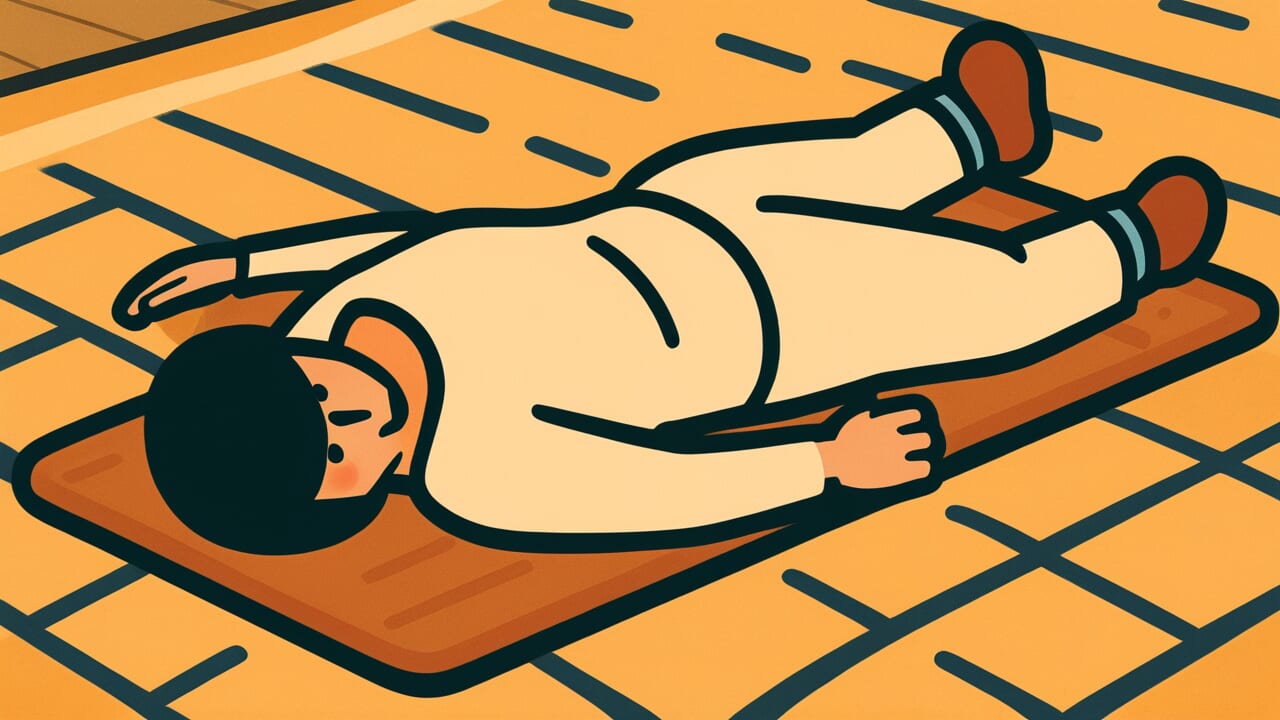How to Read “If it’s a disaster, you’ll die even on a tatami mat”
さいなんならたたみのうえでもしぬ
Meaning of “If it’s a disaster, you’ll die even on a tatami mat”
This proverb means that when disaster strikes, you cannot avoid it regardless of where you are or what you’re doing.
Even on a tatami mat—the safest place possible, your own home—you cannot escape fate when disaster comes.
People often use this expression when talking to someone who worries too much.
It addresses those who become overly cautious or avoid going out to prevent danger.
The message is: “If it’s a disaster, you’ll die even on a tatami mat, so there’s no point worrying that much.”
In modern times, many people are controlled by excessive anxiety, even though risk management is important.
This proverb teaches us to accept that some things are beyond our control.
It reminds us to live with a certain level of acceptance.
Of course, it doesn’t encourage reckless behavior.
The wisdom here is to take appropriate precautions but not let excessive worry restrict your life.
Origin and Etymology
The exact origin of this proverb is unclear, but it clearly reflects Japanese views on life, death, and fate.
The phrase “die on a tatami mat” carries special meaning.
Since the Edo period, dying on a tatami mat symbolized a peaceful death.
For a samurai, it meant dying at home rather than on the battlefield.
For a merchant, it meant dying surrounded by family rather than on a journey.
Dying on a tatami mat represented the safest and happiest way to die.
Yet this proverb boldly states that even in “the safest place,” you will die when disaster strikes.
No matter how much safety you seek, you cannot escape fate.
This expresses a kind of acceptance of life’s uncertainties.
Japan’s history of unpredictable disasters likely shaped this expression.
Earthquakes, fires, and epidemics struck frequently.
No matter how carefully people lived, unavoidable misfortune existed.
Facing this reality, people valued accepting fate over excessive worry.
The influence of Buddhist karma and fatalistic worldviews can be felt in these words.
Usage Examples
- 海外旅行は危ないからと家にこもっていても、災難なら畳の上でも死ぬというし、やりたいことはやっておこう
- あの人は用心深すぎて何もできないけど、災難なら畳の上でも死ぬんだから、もっと気楽に生きればいいのに
Universal Wisdom
This proverb has been passed down because it shows us how to face our fundamental anxieties.
Humans have the ability to predict the future and avoid danger.
This ability is necessary for survival.
But when this ability becomes excessive, it traps our lives in anxiety.
We imagine every possible risk and seek perfect safety.
Yet humanity has learned through experience that some things cannot be completely controlled.
This proverb condenses that learning into wisdom.
By using the extreme expression that even “on a tatami mat”—the symbol of safety—you cannot escape disaster, it teaches the importance of accepting human limitations.
Interestingly, this is not mere resignation.
Rather, accepting what we cannot control gives us the paradoxical freedom to focus on what we can control.
We are freed from excessive worry and can live in the present moment.
Humans exist in uncertainty.
When we accept this fact, our hearts actually become lighter.
Our ancestors understood this contradictory truth.
When AI Hears This
Humans perceive “tatami mats”—their homes—as safe places and classify going out or adventuring as dangerous activities.
But mortality statistics show that home accident deaths actually rival traffic accident deaths.
In Japan, about 13,000 people die at home each year.
The intuition that “staying in a safe place prevents death” is an assumption unsupported by data.
This is a typical example of what psychology calls “illusion of control,” a cognitive bias.
Humans tend to underestimate danger in environments they control and overestimate it in unfamiliar environments.
For example, some people fear plane crashes and drive instead, but cars actually have higher fatality rates.
Attention decreases in familiar environments, dulling risk perception.
From a probability perspective, death as an event has a probability distribution independent of location variables.
In other words, humans always carry a certain death probability regardless of where they are.
Internal causes of death like heart attacks or strokes don’t choose locations.
In fact, on a tatami mat where you feel “safe” and let your guard down, there’s even a risk of delayed response to sudden health changes.
This proverb warns against the arrogance of thinking humans can control death through location or behavior.
Modern risk management tends to fall into the dualism of “avoiding danger equals safety,” but complete safety doesn’t actually exist.
Lessons for Today
This proverb teaches us a healthy way to deal with anxiety.
Modern society is an age of information overload.
Through news and social media, information about accidents and disasters worldwide reaches us instantly.
As a result, more people perceive the world as more dangerous than it actually is.
They avoid going out, don’t try new things, and avoid connecting with people.
Such defensive living may reduce some risks, but it also robs life of its richness.
This proverb recommends starting from the premise that perfect safety doesn’t exist.
This doesn’t mean becoming reckless.
It means taking basic precautions while not binding yourself with excessive worry.
What matters is having the courage to pursue what you want while facing risks.
Going to new places, meeting new people, learning new skills.
These experiences enrich life.
Rather than doing nothing out of fear of disaster, living actively with reasonable caution leads to a more fulfilling life.
Don’t let anxiety dominate your life.



Comments